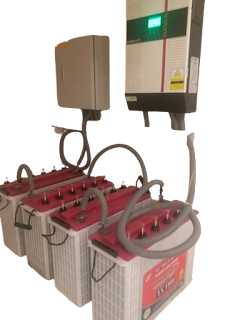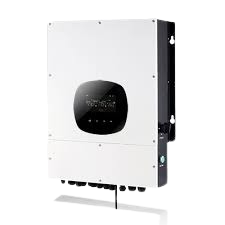The Ultimate Guide to Solar Batteries: Harnessing the Power of the Sun
Solar Batteries: The Key to Unlocking Energy Independence
In an age where energy consumption is on the rise and environmental concerns are at the forefront of global consciousness, the need for sustainable energy solutions has never been more pressing. One such solution that has gained significant traction in recent years is the use of solar batteries. These innovative devices not only store excess solar energy for later use but also play a crucial role in reducing dependence on traditional energy sources. In this blog post, we will explore the ins and outs of solar batteries, their benefits, and how they are revolutionizing the way we think about energy storage.
What are Solar Batteries?
Solar batteries, also known as solar energy storage systems, are devices that store energy generated by solar panels for later use. They work by converting the direct current (DC) electricity produced by solar panels into alternating current (AC) electricity, which can be used to power appliances and devices in your home or business. Solar batteries come in various shapes and sizes, ranging from small, portable units to large-scale systems designed for commercial use.
How Do Solar Batteries Work?
Solar batteries work by storing excess energy generated by solar panels during the day for use at night or during periods of low sunlight. When sunlight hits the solar panels, it generates electricity, which is then fed into the solar battery for storage. The battery stores this energy until it is needed, at which point it is converted back into electricity and used to power your home or business.
Benefits of Solar Batteries
Energy Independence:
One of the biggest benefits of solar batteries is that they allow you to become more energy independent. By storing excess energy generated by your solar panels, you can reduce your reliance on the grid and avoid energy price hikes.
Cost Savings:
Solar batteries can help you save money on your energy bills by allowing you to use stored solar energy during peak times when electricity prices are highest. They also reduce the need to buy electricity from the grid, further lowering your energy costs.
Environmental Impact:
By using solar batteries to store and use solar energy, you can reduce your carbon footprint and help combat climate change. Solar energy is clean and renewable, making it an environmentally friendly alternative to traditional fossil fuels.
Grid Stability:
Solar batteries can help improve the stability of the electrical grid by storing excess energy and releasing it during times of high demand. This can help prevent blackouts and brownouts, especially in areas prone to power outages.
Types of Solar Batteries
There are several types of solar batteries available on the market today, each with its own set of advantages and disadvantages. Some of the most common types include:
Lead-Acid Batteries:
These are the most common type of solar battery and are often used in off-grid solar systems. They are relatively inexpensive but have a shorter lifespan compared to other types of batteries.
Lithium-Ion Batteries:
These batteries are becoming increasingly popular due to their high energy density and long lifespan. They are more expensive than lead-acid batteries but offer better performance and reliability.
Flow Batteries:
Flow batteries store energy in liquid electrolytes, allowing for scalable and efficient energy storage. They are often used in large-scale commercial solar installations.
Nickel-Cadmium Batteries:
These batteries are known for their long lifespan and high discharge rates, making them ideal for off-grid solar systems with high energy demands.
Advancements in Solar Battery Technology
In recent years, there have been significant advancements in solar battery technology, making them more efficient, affordable, and accessible than ever before. One of the most notable advancements is the development of lithium-ion batteries, which have become the go-to choice for solar energy storage due to their high energy density and long lifespan.
These batteries are also more compact and lightweight compared to traditional lead-acid batteries, making them ideal for residential and commercial solar installations where space is limited.
Another key advancement in solar battery technology is the integration of smart features and connectivity options. Modern solar batteries are equipped with monitoring systems that allow you to track your energy usage and battery performance in real-time.
Some batteries also have built-in Wi-Fi or cellular connectivity, allowing you to control and monitor your system remotely from your smartphone or computer. These smart features not only make it easier to manage your energy consumption but also help you optimize your system for maximum efficiency.
The Role of Solar Batteries in Energy Storage
Solar batteries play a crucial role in energy storage by allowing excess energy generated by solar panels to be stored and used when needed. This is particularly important in areas where grid electricity is unreliable or expensive, as solar batteries can provide a reliable source of backup power.
In addition, solar batteries can help reduce the strain on the grid during peak times by storing excess energy and releasing it when demand is high.
Off-Grid vs. Grid-Tied Solar Batteries
There are two main types of solar batteries: off-grid and grid-tied. Off-grid solar batteries are used in standalone solar systems that are not connected to the grid. These systems are typically used in remote areas where access to grid electricity is limited or non-existent.
Off-grid solar batteries are designed to store enough energy to power a home or business for several days without sunlight.
On the other hand, grid-tied solar batteries are connected to the grid and are used in conjunction with solar panels to reduce reliance on grid electricity. These systems can store excess energy generated by solar panels during the day and use it at night or during periods of low sunlight.
Grid-tied solar batteries can also help reduce electricity bills by allowing homeowners to sell excess energy back to the grid through net metering programs.
Conclusion:
Solar batteries are a game-changer in the world of renewable energy, offering a reliable and sustainable way to store and use solar energy. Whether you are looking to reduce your energy bills, become more energy independent, or reduce your carbon footprint, solar batteries can help you achieve your goals.
With advancements in technology and decreasing costs, solar batteries are becoming more accessible to homeowners and businesses alike. Embracing solar energy and solar batteries is not just a step towards a greener future, but also a smart investment in a more sustainable way of life.




Comments
Post a Comment